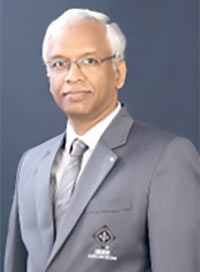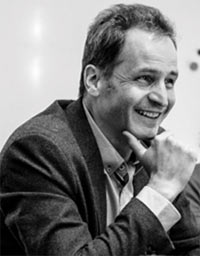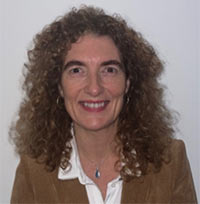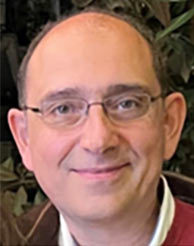Meet the Candidates for the 2025 SPS President-Elect Special Election
The Signal Processing Society will be holding a Special Election for President-Elect between 6 February - 26 March.
Learn more about the candidates and their vision for their Presidency below!
- More information can be found on the candidates' web pages, linked to their names in their biographies (below).
Meet the Candidates:
The candidates appear in alphabetical order by surname.

Candidate Statement:
My vision for the Signal Processing Society is to strengthen the community that promotes signal processing to advance technology for humanity. Toward this goal, I pledge to pursue the following objectives:
- Enable active engagement of all stakeholders to make SPS a diverse, inclusive, equitable, sustainable and vibrant community.
- Expand the community by reaching out to professionals in other disciplines that use signal processing.
- Educate the next generation of technologists about the power of signal processing tools.
- Embrace new disruptive tools and technology innovations.
- Enhance the technical level of conferences and journals to make them the “go-to” destination for researchers, industry professionals and policy makers.
- Encourage strong industry-academia relationships that promote innovation.
- Empower chapters, technical committees, and industry groups to provide enhanced member benefits at affordable cost.
- Engage with the community in an open, transparent, and ethical manner.
The future of signal processing involves embracing new application areas, triggering the development of new theoretical and practical tools, contributing to the body of knowledge and enabling innovation.
The effective education of the next generation signal processing researchers and practitioners is critical for rapid creation and deployment of emerging technologies. SPS must play a key role in accelerating the pace of continuing education, at scale. My priority will be to enable access to curated multimedia education content by leveraging the talented SPS educator community in academia and industry, and to empower SPS chapters to organize educational events, for students of all ages and preparation, with active collaboration between industry and academia to address problems with local context.
Excellence in SP research is vital. Organizing affordable, inclusive, accessible, sustainable, and joyous conferences is imperative. SPS journals need to be the destination of highest quality work and policies for quick reviewing and affordability will be put in place.
Innovation is key and disruptive ideas will be encouraged in all SPS activities to create breakthroughs in technology solutions for challenging problems of relevance to humanity. An annual networking event inviting thought leaders, futurists, distinguished academicians, smart innovators and funding agencies will be organized to create a vibrant community that will shape the technology landscape of the future.
Standardization is vital for the rapid adoption of technologies and a framework to organize workshops on standardization with the active involvement of standards bodies, industry practitioners and academia at SPS chapters, and conferences will be established.
Diversity, equity and Inclusion are important cornerstones of our Society and I will support and enhance processes to imbibe and ingrain this ethos in our volunteers and staff. We will make SPS an inviting place for women, underrepresented groups, and others to express freely and to pursue excellence joyfully!
My substantial experience as a volunteer in different positions in my professional career and in the IEEE and SPS have prepared me to take this global responsibility of propelling the society to new heights. We will do this as a team and in the spirit of service to “be good and do good”.
Candidate Biography
K.V.S. HARI (F) is a professor of Electrical Communication Engineering and the Director of Center for Brain Science at Indian Institute of Science, Bangalore. He has held affiliate and visiting appointments at KTH-Royal Institute of Technology, Stanford University and Aalto University. He is a co-founder of ESQUBE Communication Solutions at Bangalore.
Hari’s research interests include statistical, sparse and array signal processing and machine learning, with applications to communication, radar, navigation and autonomous systems, assistive technologies, MRI, and neuroscience. He made fundamental contributions to the performance analysis of subspace methods for direction-of-arrival estimation and to MIMO wireless channel modelling and contributed to the IEEE 802.16 standard for wireless MIMO systems.
Hari has served in several leadership positions of IEEE and the Signal Processing Society. He has established close working relationships with members from academia, industry, and government agencies, ensuring diversity in participation during several events organized by him ranging from technical seminars and workshops to international conferences.
He served as VP-Membership of SPS (2020-22), was the SPS Regional Director-at-Large of Region 10 (2018-19), and member of the Membership Board (2018-22). He served as Chair of the IEEE Bangalore Section (2016). He was appointed Chair, 2017 India Strategy Committee by the IEEE President, to develop a strategy document for the growth of IEEE in India. He was a Co-Chair, IEEE Region 10’s 50-year Celebrations and Region 10’s Students, Young professionals, Women and Life members Congress in 2016. This activity brought close to 1000 participants from all over R10. He served as the founding General Chair, IEEE International Conference on Electronics, Computing and Communication Technologies (CONECCT) (2012, 13), the flagship conference of the IEEE Bangalore Section, which has continued as an annual event. He was a Member, IEEE University Programs Ad-hoc Committee of the IEEE Educational Activities Board in 2010.
Hari was a member of the SPTM TC (2014-2019) and was chair of the SPS Bangalore Chapter (2005, 2011-13). He was VP-Membership of SPS (2020-22), SPS Regional Director-at-Large of Region 10 (2018-19) and a member of the SPS Membership Board (2018-22). During his tenure as RDAL, SPS membership in R10 increased from 4491 (27% of total) in 2017 to 6154 (33%) in 2019. As VP-Membership, he triggered similar growth across all regions by leading special initiatives for students, women, and industry professionals, and in Africa, Latin America, and Asia.
He was a General Co-Chair, 2016 IEEE International Conference on Advanced Networks and Telecommunication Systems and currently for the 50th ICASSP, to be held for the first time in India, in 2025.
Hari was an Editor of the EURASIP journal Signal Processing (2006-16) and is the Editor-in-Chief (Electrical Sciences) of the Indian Academy of Sciences journal, SADHANA. He was a member of the Governing Council of the Telecom Standards Society, India, and the chair of its Standardization Committee. He is a Fellow of the Indian National Academy of Engineering, Indian National Science Academy, and IEEE. He is a member of Eta Kappa Nu and the recipient of the 2018 IEEE MGA Leadership award.
More Information

Candidate Statement:
SPS appears to be thriving, e.g., with membership and journal/conference submission numbers showing consistent growth. Nevertheless, it has become clear that some of its critical structures and processes have become non-scalable, non-sustainable, or even malfunctioning. It is essential that these be redesigned, to support healthy further growth. This should be done with emphasis on service and quality, rather than profit and quantity, while demonstrating appreciation and respect for volunteers.
-
Journals and conferences
With journals offering similar target submission-to-publication times, conferences no longer offer the sole fast track to publication. Journals and conferences should therefore be jointly managed as one ecosystem, to fully exploit journal-conference synergies, and allow strategic positioning against the newer (but larger) ML/AI conferences. To guarantee consistent journal and conference publication policies, closer collaboration is needed between the Publications and Conferences Board. To guarantee continuity in policy implementation, structural assistance should be provided to conference organizing committees. For publications, open access should be kept affordable and more heavily supported. For conferences, hybrid/virtual formats should be further developed for those not able or willing to travel. -
Quality control
Quality control in publications cannot be compromised. However, recruiting qualified reviewers, especially in journals, has become problematic, leading to missed timeliness targets, burnout among editors, and dissatisfaction among authors. In addition to recent adjustments to editorial board structures and workflows, a systematic review commitment and performance monitoring should be implemented to safeguard review quality and editorial productivity, ideally also reducing the review load for the TCs. -
Services vs. service
Full support will be given to new initiatives aimed at enhancing member services, e.g., the educational program to offer curated educational content, and the establishment of the Industry Board to better serve industry members. Simultaneously, many more members should be encouraged to take on active volunteer roles, e.g., as reviewers, editors, TC members, mentors. More opportunities should be provided for early career volunteers, training activities should be expanded. To engage more members into sustained volunteer service, volunteer positions should require realistically budgeted time commitments and be sufficiently supported by staff. -
Ethics
IEEE ethical standards must be strictly enforced. In a globalized community with significant cultural differences, more ethics education should be provided, while strong ethical leadership should foster a culture of integrity and transparency. Journals and conferences are increasingly dealing with author/reviewer misconduct cases (ChatGPT!). To ensure consistency and efficiency, and offload editorial boards and conference committees, a society-level ethics committee should be established, as a gateway to IEEE-level support. -
Finances
SPS is often perceived as a non-transparent business offering overly expensive services. SPS activities are primarily financed from publication revenue. This relies on a paywall model, which is increasingly at risk with the proliferation of free repositories, and furthermore will be significantly reduced by the transition to open access. Therefore, a more transparent and sustainable financial model should be adopted.Addressing these and other challenges requires cooperation among leadership and volunteers. I firmly believe that my recent involvement in SPS has given me the experience and understanding to lead this endeavor.
Candidate Biography
Marc Moonen (F) obtained his PhD degree from KU Leuven, Belgium, in 1990, and has been a Full Professor at KU Leuven, since 2004. Prior to this, he held postdoctoral, and assistant/associate professor positions at KU Leuven, was a PhD- and postdoctoral visiting researcher at the University of Stanford, University of Minnesota, and Delft University of Technology, and visiting professor at ALaRI, University of Lugano.
He was head of STADIUS Center for Dynamical Systems, Signal Processing, and Data Analytics for eight years (2013-2021), a KU Leuven research division with 10+ professors and 150+ PhD- and postdoctoral researchers.
His research is in the field of numerical algorithms and signal processing for digital communications, digital audio- and speech processing. He has supervised/co-supervised 60 defended PhD-theses, authored/co-authored 300+ journal papers (175+ in IEEE journals) and 400+ international conference papers (150+ in IEEE conferences).
His research has consistently had a strong industry focus, e.g., with over twenty years of ongoing cooperation in the area of digital subscriber lines with Nokia Bell Labs (formerly Alcatel-Bell/Alcatel-Lucent) and in the area of hearing instruments and cochlear implants with Cochlear Ltd. He is also a co-founder of conneXounds (www.connexounds.com), a company developing BYOD audio technology for hybrid meeting environments.
He is an IEEE Fellow (2007) and a Fellow of EURASIP (2018). He received a EURASIP Meritorious Service Award (2020), and was co-recipient of the EU/CELTIC Excellence Award (2008) and 10 journals/conference best paper awards.
IEEE service
He served as SPS Vice President-Publications (2021-2023). Together with the Publications Board, he reorganized the workflow and editorial board structure to improve timeliness and strengthen quality control in the largest SPS journals, modified and automated the nomination/self-nomination process for editorial board members and adjusted policy to allow longer SAE/AE terms, initiated the OJSP short paper submission track for ICASSP/ICIP with editorial board sharing across journals, streamlined requirements for journal paper presentations in conferences, initiated paper cascading ideas, and revised several policies and procedures to improve overall efficiency.
He also served as member-at-large of the SPS Board of Governors, as member of the SPS Awards Board, the SPS Fellow Reference Committee, the SPS Nominations and Appointments Committee, the SPS TC on Signal Processing for Communications, the ICASSP-2008 Organizing Committee, and as Chair of the SPS Benelux Chapter. He was a member of the editorial board of the Transactions on Circuits and Systems-II, the Signal Processing Magazine, and area editor for ‘Feature Articles’ for the Signal Processing Magazine.
EURASIP service
He was President of EURASIP (European Association for Signal Processing) for four years (2007-2008, 2011-2012). He served on the EURASIP Board of Directors for altogether sixteen years, also as Treasurer/Secretary and as Director for Publications. He served as Chair of the EURASIP Fellow Selection Committee, and as member of the EUSIPCO-2010 and EUSIPCO-2015 Organizing Committee. He was Editor-in-Chief for the EURASIP Journal on Advances in Signal Processing, and was member of the editorial board of the EURASIP Journal on Advances in Signal Processing, EURASIP Journal on Wireless Communications and Networking, and Elsevier Signal Processing.
More information:

Candidate Statement:
Leading the IEEE Signal Processing Society (SPS), with over 20,000 members globally, offers exciting opportunities to enhance technical excellence, education, and our international network. My goal as President-Elect is to advance this mission by focusing on three strategic priorities:
1. Enhance Member Value and Engagement: Create new initiatives and ensure that members have access to existing opportunities.
- Tailoring Membership Benefits by aligning fees with local income levels and emphasizing inclusivity.
- Expanding professional development opportunities and initiatives of the SPS Educational Board, such as courses, certifications, and career resources.
- Providing greater access to cutting-edge research of excellence through journals, webinars, white papers, exclusive previews of industry trends, and datasets.
- Working towards ensuring top-quality and relevance of publications and conferences. Conducting feasibility studies for new activities and developing a data-driven business strategy that will enhance performance tracking.
- Strengthening community by fostering networking through local chapters and multilingual events to ensure broader accessibility.
- Supporting retention by encouraging active involvement and volunteerism, showcasing the value of engagement.
- Promoting diversity and fairness in recognizing achievements.
- Introducing initiatives highlighting how signal processing enables sustainability, such as advanced methods for energy-efficient communications, smart grids, and environmental monitoring.
2. Attract and Diversify Membership: Broaden the society’s appeal to students, professionals, and underrepresented groups worldwide.
- Highlighting tangible benefits like discounted memberships or trial programs.
- Leveraging emerging trends like green technology and climate solutions to engage new members through webinars and events.
- Targeting students and young professionals with scholarships, competitions, promotion of soft skills, career mentoring, and entrepreneurship, focused on fields such as renewable energy technologies or sustainable urban systems.
- Expanding global outreach, tailoring offerings to regional needs and working with underserved communities to encourage their participation in advancing sustainable technologies.
3. Foster Industry Connections and Real-World Impact: Work with the newly established Industry Board to strengthen ties with industry to bridge academia and practice, ensuring members see career-oriented value.
- Expand services and products for industry professionals, such as on-demand webinars or life-long learning.
- Leverage prominent figures in the industry to attract attention to IEEE SPS.
- Showcase how IEEE SPS membership supports career advancement in fields like AI, 5G, robotics, and climate-conscious technologies.
- Partner with companies to provide job placements and research commercialization support.
- Advocate for industry collaborations to advance real-world applications in sustainability, such as energy harvesting, or precision agriculture.
As SPS President-Elect, I will nurture a Society that is inclusive, data-driven, and constantly evolving. SPS has immense potential to lead in fields that impact nearly every aspect of modern life. In this role, I would foster transparency, accountability and sustainability across all our processes, ensuring that our members feel their voices are heard and their contributions are valued. My aim is to ensure that, as an SPS member, you can fully access and benefit from everything our society provides without encountering any barriers.
Candidate Biography
Prof. Ana Pérez-Neira (F) is a full professor at Universitat Politecnica de Catalunya (Spain), in the Signal Theory and Communication department. Currently, she is the Director of the CTTC – Centre Tecnològic de Telecomunicacions de Catalunya, Spain, which is a research center, independent from the University. She is an IEEE Fellow, EURASIP Fellow, member of the Royal Academy of Science and Arts of Barcelona, and of the Royal Academy of Engineering of Spain.
Throughout her professional career, she has been fortunate to serve the research community in various roles. She was Vice Rector for Research of UPC (2010-14), and founded the UPC Doctoral School. She was a member of the EURASIP (European Association for Signal Processing) Board of Governors (2008-2017), serving as Vice-President for Membership and later for Awards. She was also a recipient of the EURASIP Meritorious Service Award (2018).
Since 2010, Prof. Pérez-Neira has made outstanding contributions to promoting the technical and educational activities of the Signal Processing Society. She served as an Associate Editor of the IEEE Transactions on Signal Processing (IEEE TSP) for six years. In 2011, she was elected a member of the IEEE Signal Processing Society's Signal Processing Theory and Methods (SPTM) Technical Committee for six years. In 2017, she joined the Signal Processing for Communications (SPCOM) Technical Committee and became an IEEE SPS Regional Director-at-Large for Region 8. In 2019, she was elected a Member-at-Large of the SPS Board of Governors (BoG) (2019-2023). In 2020, she became a Senior Area Editor (SAE) of the IEEE Open Journal of Signal Processing (OJSP). She has been member of the BoG (2019-2023) and served as Vice-President for Conferences (2021-23). She has been the general co-chair of IEEE ICASSP 2020 (the first IEEE virtual flagship conference ever with 15,000 virtual attendees). She will also be serving as General Co-Chair of ICASSP 2026.
More information:

Candidate Statement:
SPS has been my professional home for 35 years. I have benefited tremendously from the unique mix of theory and methods, algorithms and applications, the breadth, versatility, and research entrepreneurship of this community, which I have served from the trenches to leadership positions. SPS is a vibrant community, and we have a lot to celebrate – the success of our flagship journals and conferences, thriving local chapters, and new educational programming to name a few. At the same time, we are facing growing challenges:
- We have to address the peer review crisis – it has become incredibly hard to secure quality reviews and the use of AI is spiraling out of control. Our current approach is neither effective nor scalable.
- We should offer open access for our flagship transactions at a reasonable fee ($1000), further reduced for members in developing economies. Top competitors offer open access for less. The combination of affordable open access with quality reviews and the prestige of our flagship transactions will create added value and impact.
- We should turn ICASSP and ICIP into major industry recruiting events for our students. They are the future of SPS and our main link to industry. This will also strengthen industry engagement.
- We need an SPS Leadership Academy to help train new volunteers on leadership matters – like how to handle conflict of interest and difficult conversations, how to encourage diverse ideas, opinions and ownership of new initiatives – using case studies that members can relate to.
- We should strengthen diversity and foster a culture of truly inclusive excellence – we have made considerable progress, but much remains to be done.
- Recent events have made it clear that we need more transparency and accountability. I encourage you to find out and ask where candidates stand on this matter. I reaffirm my faith in IEEE and the broad SPS community. We will come together to make SPS a more inclusive community that not only upholds but actively cultivates ethical leadership, accountability, and respect for all its members. I will work with the IEEE, SPS and the proposed SPS Leadership Academy to implement changes that matter.
I’m eager to start working on these important initiatives. I have a proven record of inclusive and impactful service, and I would be honored to serve you if elected.
Candidate Biography
Nicholas Sidiropoulos (F) earned his Electrical Engineering Diploma in 1988 from the Aristotle University of Thessaloniki, Greece, and his Ph.D. in Electrical Engineering in 1992 from the University of Maryland at College Park. He is the Louis T. Rader Professor in the Electrical and Computer Engineering Department of the University of Virginia (UVA).
He has served as department chair (2017-2021) at UVA, where he made excellent and diverse faculty hires – each and every one of his tenure-track hires won the prestigious NSF CAREER award. He has also served on the faculty of the University of Minnesota as ADC Chair Professor in Digital Technology, and the Technical University of Crete, Greece, where he also was department chair.
His research interests are in signal processing, communications, optimization, tensor decomposition, and machine learning. He received the NSF/CAREER award in 1998, the IEEE Signal Processing Society (SPS) Best Paper Award in 2001, 2007, 2011, and 2022, and the IEEE SPS Donald G. Fink Best Overview Paper Award in 2022. He received the 2010 IEEE SPS Meritorious Service Award, the 2022 Technical Achievement Award of EURASIP, and the 2022 IEEE SPS Claude Shannon – Harry Nyquist Technical Achievement Award. He is a Fellow of IEEE (2009) and a Fellow of EURASIP (2014).
He has been an active IEEE SPS member for 35 years, including multiple terms in three technical committees (SPCOM, SAM, MLSP), serving as chair of the SPCOM TC, associate editor for SPL and TSP, Senior Area Editor for TSP, TPC chair and general co-chair for various SPS workshops, and member of the organizing committee for several editions of ICASSP (Prague, Brisbane, Rhodes-Greece). He served as IEEE SPS Distinguished Lecturer (2008-2009), Vice President – Membership of IEEE SPS (2017-2019), and S/TC Fellow Evaluation Committee Chair for IEEE SPS (2020-2021). In 2016, he chaired a committee tasked with developing an SPS-related repository under arXiv, and established arXiv/eess (Electrical Engineering and Systems Science https://arxiv.org/archive/eess), the first engineering repository under arXiv, which now attracts order of ten thousand preprints/year. This has greatly enhanced the visibility and footprint of SPS, especially in sister communities. While serving as SPS Vice President for Membership, he led a charge to reduce SPS membership fees for members in developing countries, and another to ensure proper representation of the different technical constituencies within SPS on the awards board, the N&A committee, and the SPS Fellow evaluation committee.
More information:
